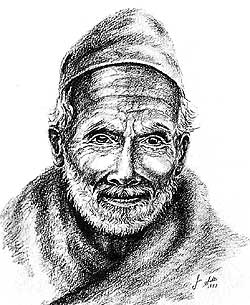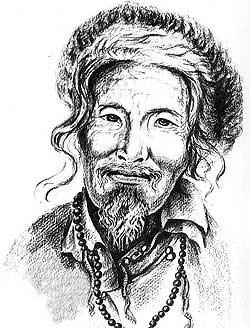 Kanak Mani Dixit in "Bahuns and the Nepali State" (#65) seems to have completely overlooked the fact that a good majority of Bahuns in remote parts of the country are living in poverty, are uneducated and unsophisticated-very much like the counterparts he has compared them with. Bahuns may have 98 percent of the civil service jobs, but how about for other industries? What made Dixit concentrate on Bahuns in the civil service? For example, if he looked at businesses, it would be dominated by the Newars. Travel and tourism would be where Gurungs, Rais and others hold prestigious positions. But taking only the civil service statistics to conclude that Bahuns are responsible for the ill fate of Nepal shows narrow vision. This is "dog ate my home work" type of analysis. The real problem is lack of proper education, let's not make any one community a scapegoat here.
Kanak Mani Dixit in "Bahuns and the Nepali State" (#65) seems to have completely overlooked the fact that a good majority of Bahuns in remote parts of the country are living in poverty, are uneducated and unsophisticated-very much like the counterparts he has compared them with. Bahuns may have 98 percent of the civil service jobs, but how about for other industries? What made Dixit concentrate on Bahuns in the civil service? For example, if he looked at businesses, it would be dominated by the Newars. Travel and tourism would be where Gurungs, Rais and others hold prestigious positions. But taking only the civil service statistics to conclude that Bahuns are responsible for the ill fate of Nepal shows narrow vision. This is "dog ate my home work" type of analysis. The real problem is lack of proper education, let's not make any one community a scapegoat here.
Imit Sams
by email
Why is it that everyone in Nepal hates Bahuns? And why doesn't anyone dare come forward to defend them against allegations that they are ruining the country? Either Kanak Mani Dixit feels guilty about being a Bahun, or he simply believes in what he hears.
I admit there isn't equal representation of all ethnic groups in decision-making bodies and for some obvious and some not-so-obvious reasons, Bahuns and Chettris tend to dominate them. But that does not mean other ethnic groups in Nepal are oppressed, or exploited. Actually, Bahuns are probably the most oppressed group in Nepal. We have had Kirati kings, we have had Newar kings, we have had Thakuri kings, we have had kings of all other groups, but we never had a Bahun ruler. In fact, we are the most oppressed group in Nepal. Poor Bahuns work at chule-Bahuns at the homes of rich Newars. They are the ones who get to eat katto-which no other group even dares to touch. We are the ones who always get blamed for whatever goes wrong in the country, and people like Dor Bahadur Bista (author of Fatalism and Development, another example of intellectual mediocrity) and Dixit fail to, or simply pretend not, to know this.
Dixit writes about his friend Tashi being summoned by this Bahun/Chettri looking gentleman. Why doesn't he write about the numerous incidents where Bahuns are insulted by other ethnic groups? Dixit makes Bahuns who have nothing to do with what goes on in the country unnecessarily guilty about their heritage. OK, I admit certain Bahun prime ministers have screwed up the country, but haven't there been prime ministers from other ethnic groups who have been equally unsuccessful? Is the Nepali Times brave enough to publish this letter? I suppose not.
Trailokya Raj Aryal
Kathnmandu
There is no system better than democracy. We cannot go back to an autocratic system. As Dixit points out, our country still remains an incomplete democracy. We should be able now to find gaps in each sector of our democratic system and correct it. Once the system functions well, there will not be any discrimination to Nepalis-Brahmin or otherwise. Dixit has also put forward the idea of proportional representation from each ethnic group. This may contradict the basic principle of the majority in a democracy.
BP Poudyal
Richmond, California
I applaud your efforts in pointing out the sociological consequences of the Brahmin dominance in Nepali society and politics. Our society is still in the feudal-medieval age regardless whether we are in the 21st century or not. The Brahmin (priest) is the medium between god and humans. This medium of interpretation of the supernatural gives the Brahmin extreme power. It is natural for human beings to be inclined towards self-preservation according to social Darwinism. Some may suggest getting rid of the caste/class system, but this would merely take the branches off a tree, not the root. We must translate all Brahmin texts into vernacular languages so average Nepalis can evaluate and analyse the doctrines, concepts and values of the system. Then we will have a true Nepali renaissance, enlightenment and revolution in our thinking and culture.
Subarna Bhattachan
USA  Kanak Mani Dixit is neither a narcissist nor a masochist, so why does he take pleasure in blowing up a volatile issue in a society that is already ethnically fractured? There have been lapses in the past, yes, but we cannot change the picture by simply condemning them or giving more opportunities to the so-called underprivileged. It is the attitude that needs to be changed-the attitude of the whole people, including those of the underprivileged. Is Kanak Mani Dixit who he is today because of his abilities, or simply because he is a Bahun?
Kanak Mani Dixit is neither a narcissist nor a masochist, so why does he take pleasure in blowing up a volatile issue in a society that is already ethnically fractured? There have been lapses in the past, yes, but we cannot change the picture by simply condemning them or giving more opportunities to the so-called underprivileged. It is the attitude that needs to be changed-the attitude of the whole people, including those of the underprivileged. Is Kanak Mani Dixit who he is today because of his abilities, or simply because he is a Bahun?
Hari Sharma Dahal
Dharan
Congratulations to Kanak Mani Dixit for being bold and honest on the issue of ethnic groups being under-represented in Nepali politics and government administrative jobs. With a long history of natabad and kripabad, Nepal was bound to have this unfair and unjust representation. For a long time, Bahuns have had the upper hand in Nepali politics, and that grip has increased. As a boy in predominantly Newari community, I was advised to be a doctor, engineer or businessman when I grew up. But never a politician or a jagire. My elders gave me this advice not because they hated these professions but perhaps they tried and they were severely discouraged to be in such a field. I do not know whether Bahuns are to be blamed exclusively for the sorry state of the country, but one thing is clear: this poor representation has to end and I am sure the dominance of Bahuns will erode as education spreads. Some of my best friends are Bahuns, they are no different than me. For me this question of Newar vs Bahun/Chettri is not relevant. More relevant is a good blend of representation from all ethnicities in our bureaucracy and politics.
"DBK"
New Jersey
While I agree with Kanak Mani Dixit's argument that there is a need of greater participation from all ethnic groups, I don't believe in your approach. You present the data of the Public Service Commission job referrals showing the increasing participation of Bahun people. But this does not necessarily mean that the PSC is discriminating against other ethnic groups. Though there can be some loopholes, I believe the PSC exams are fair. If no one from a particular ethnic group does well, it is not discrimination by default-it is deficient and uneven education. In my student says I saw some Bahuns (especially from Syangja) preparing hard for the PSC exam for years and eventually succeed. They didn't get their jobs because they were Bahuns, but because they worked hard. There is a need for greater participation of the dalits and janajatis in nation building, but this does not mean they should get an opportunity to replace well-trained and competent people just because of belonging to a particular ethnic group. The only way to ensure greater participation of non-Bahuns is to give them access to good education. The true enemy is illiteracy, not Bahuns. Let's not disturb our socio-cultural harmony by scapegoating one ethnic group. I belong to a new generation of Bahuns, I don't have any prejudice against Dailts or janjatis. I believe in freedom and democracy, fair play and justice. I don't want to be blamed for the injustices of my ancestors.
F Nepal
USA
I was very moved by Kanak Mani Dixit's analysis. I am not a communal janjati. I would be moved even if I were a Bahun. I am an idealist and believe in justice and fairness. We may have different value systems, but we all agree on certain universally accepted and appreciated human values. Dixit's approach is humane, forgiving and generous. He could easily be another one of those arrogant, self-centered, narcisistic and (worst of all) selfish Nepalis. However, he has judiciously chosen to feel for Nepal's indigenous janjatis. I do not believe in the blame culture, but is it justifiable for 12 percent of the population of a country to occupy over 80 percent of all the jobs in politics, bureaucracy, judiciary? On the other hand, the majority of Nepali martyrs have been non-Bahuns. Other communities must learn the good attributes from smart Bahuns but speak out against Bahunismm. It is sad to see many janjatis following the values of Bahunism. We need more Bahuns like Dixit, people with bigger hearts and larger brains.
KR Rai
UK
The issues discussed by Kanak Mani Dixit are easily brushed aside with the standard argument about meritocracy. According to this argument, the preponderance of Bahuns in civil service, political leadership and other important sectors can be accounted for by the Bahuns' superior educational qualifications. As a member of an ethnic group keenly following the issue, I would love to hear what our ethnic activists have to say about this counter-argument. Dixit and the editorial team in Nepali Times deserve plaudits for openly discussing an issue that largely remains a taboo in the mainstream media. The solution pointed out by Dixit is also admirable as it prudently steers clear of extreme positions taken by some radical elements on both sides of the divide.
Ram Limbu
Sydney
Hats off to Kanak Mani Dixit for taking on such a controversial topic even though he himself belongs to the Bahun community. I am a girl of 18, and unfortunately I have felt the superior attitude among the parbatiyas about other communities that Dixit talks about. It is necessary to address these grievances and the oppressive psyche now so that it does not erupt into violence later. It is a long and difficult job, but it is important to tackle it head-on. After all, it doesn't really matter whether we are Bahun, Chettri, Rai or Gurung. We are all Nepalis.
Aacista Gurung
Kathmandu


